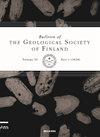Wiborg rapakivi花岗岩基中某些深成岩的年龄和同位素指纹图谱,并特别参考了Ristisaari岛的暗wiborgite。
IF 1.3
4区 地球科学
Q2 GEOLOGY
引用次数: 18
摘要
Wiborg rapakivi花岗岩基中部分深成岩的年龄和同位素指纹——以Ristisaari岛暗维博岩为例1)芬兰赫尔辛基大学地球科学与地理系地质学部,FI-00014邮编64号邮编Rälssintie 12, FI-47200 Elimäki,芬兰3)芬兰地质调查局,FI-02150埃斯波,邮编96号邮编4)芬兰国家SGL实验室,芬兰地质调查局,FI-02150埃斯波,邮编96号邮编芬兰东南部和邻近的俄罗斯的中元古代,经典座Wiborg rapakivi花岗岩岩基包括一个变化多端的双峰(硅基)深成岩、次火山岩和火山岩序列。在目前的侵蚀水平上,硅质岩石占主导地位,其中最突出的是威博岩和暗威博岩(被认为标志着岩基的主要形成阶段)和黄铁矿。新的观测和光学显微镜数据显示,在Wiborg岩基南部的Ristisaari岛上,深色维博长岩占主导地位,深色维博长岩中的深色斜长石巨晶是钙质异晶。它们很可能是在双峰岩浆体系演化过程中,从同源地块型斜长岩岩浆中被合并到威博辉岩岩浆中。我们的新ID-TIMS锆石U-Pb年龄为1627±3 Ma,是迄今为止为Wiborg岩基深成岩确定的最年轻的同位素年龄。这与先前存在的U-Pb锆石数据相结合,表明基底深部岩石的侵位至少持续了12毫秒(1642-1630 Ma)。结合高海拔堤防岩石的数据,至少有20毫安(1642-1622毫安)的窗口。此外,随着岩基的增长,岩浆活动的总体轨迹可能向南移动。本文还报道了Ristisaari岛暗威博长岩和基岩中另外3种花岗岩的全岩Nd同位素数据,以及基岩中东部的一种光斑块状斜长岩的Nd(全岩)和Sr(全岩斜长石)同位素数据。这些数据表明,在斯韦芬尼系造山带东南部的威堡基区,岩石圈的整体地幔分离年龄可能略有不同。本文章由计算机程序翻译,如有差异,请以英文原文为准。
Age and isotopic fingerprints of some plutonic rocks in the Wiborg rapakivi granite batholith with special reference to the dark wiborgite of the Ristisaari Island.
Age and isotopic fingerprints of some plutonic rocks in the Wiborg rapakivi granite batholith with special reference to the dark wiborgite of the Ristisaari Island 1) Department of Geosciences and Geography, Division of Geology, P.O. Box 64, FI-00014 University of Helsinki, Finland 2) Rälssintie 12, FI-47200 Elimäki, Finland 3) Geological Survey of Finland, P.O. Box 96, FI-02150 Espoo, Finland 4) The National SGL Laboratory, c/o Geological Survey of Finland, P.O. Box 96, FI-02150 Espoo, Finland The mid-Proterozoic, locus classicus Wiborg rapakivi granite batholith of southeastern Finland and adjacent Russia comprises a varying, bimodal (silicic-basic) sequence of plutonic, subvolcanic, and volcanic rocks. At the current level of erosion silicic rocks are dominant, the most prominent of which are wiborgites and dark wiborgites (that have been considered to mark the main build-up stage of the batholith) and pyterlites. New observations and optical microscopy data from the dark wiborgite-dominated Ristisaari Island in the southern, off-shore part of the Wiborg batholith show that dark plagioclase megacrysts in dark wiborgite are calcic xenocrysts. They were probably incorporated into wiborgite magma from consanguineous massiftype anorthosite magmas in the course of the evolution of the bimodal magmatic system. Our new ID-TIMS U-Pb zircon age of the Ristisaari Island dark wiborgite, 1627±3 Ma, is the youngest isotopic age so far determined for the plutonic rocks of the Wiborg batholith. This, combined with preexisting U-Pb zircon data, implies a minimum duration of 12 m.y. (1642–1630 Ma) for the emplacement of the plutonic rocks of the batholith. Combined with data on highlevel dike rocks, a window of at least 20 m.y. (1642–1622 Ma) is implied. Furthermore, as the batholith grew, the overall locus of magmatism may have shifted southwards. New whole-rock Nd isotope data on the dark wiborgite of the Ristisaari Island and three further granites of the batholith, as well as Nd (whole-rock) and Sr (whole-rock, plagioclase) isotope data on a spectrolite massif-type anorthosite from the east-central part of the batholith, are also presented. These data suggest that the lithosphere across the Wiborg batholith area in the southeastern part of the Svecofennian orogen may vary slightly in overall mantle separation age.
求助全文
通过发布文献求助,成功后即可免费获取论文全文。
去求助
来源期刊
CiteScore
1.30
自引率
0.00%
发文量
5
审稿时长
>12 weeks
期刊介绍:
Bulletin of the Geological Society of Finland (BGSF) publishes research articles and short communications in all branches of geosciences. Contributions from outside Finland are welcome, provided that they contain material relevant to Finnish geology or are of general interest.

 求助内容:
求助内容: 应助结果提醒方式:
应助结果提醒方式:


